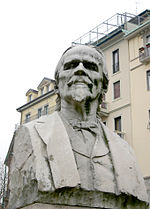Andrea Verga, Date of Birth, Place of Birth, Date of Death
TweetAndrea Verga
Italian psychiatrist
 Date of Birth: 20-May-1811
Date of Birth: 20-May-1811
 Place of Birth: Treviglio, Lombardy, Italy
Place of Birth: Treviglio, Lombardy, Italy
Date of Death: 21-Nov-1895
Profession: physician, politician, psychiatrist
Zodiac Sign: Taurus 
About Andrea Verga
- Andrea Verga (May 20, 1811 – November 21, 1895) was an Italian psychiatrist and neurologist. Born in Treviglio, Verga became clinical professor of psychiatry at the Ospedale Maggiore in Milan.
- In 1864, with Serafino Biffi (1822-1899), he founded the Archivio Italiano per le malattie nervose e più particolarmente per le alienazioni mentali (Italian Archives for Nervous Disease and Mental Illness). Verga is remembered for his pioneer work done in the study of the criminally insane, as well as his early research of acrophobia, a condition he personally suffered from. In 1851 he described a posterior extension of the cavum septi pellucidi, an anomaly that is found in a small percentage of human brains.
- It was later named the "cavum Vergae" (Verga's ventricle), or the "sixth ventricle".
- This name is considered a misnomer because Verga's ventricle doesn't contain cerebrospinal fluid nor is it lined by ependyma. Verga is buried in Milan, at the city's Monumental Cemetery.
Read more at Wikipedia
See Also
- Famous People's Birthdays on 20 May, Italy
- Famous People's Birthdays in May, Italy
- Famous physician's Birthdays on 20 May, Italy
- Famous physician's Birthdays in May, Italy
- Famous politician's Birthdays on 20 May, Italy
- Famous politician's Birthdays in May, Italy
- Famous psychiatrist's Birthdays on 20 May, Italy
- Famous psychiatrist's Birthdays in May, Italy

